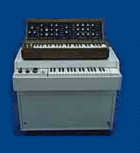






































|
Ashqelon Quilt - The Event
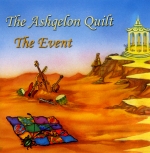
Comments:
Ashqelon Quilt are a young 3-piece prog band from Israel, and The Event is their debut CD. The band's music mixes mostly British-prog influences with psychedelic-laced vocals(in English). They also enjoy to add Celtic and Middle Eastern influences to their compositions, and I also hear neo-prog sounds every once in a while. If I was to come up with a good description of this band's sound I would say that if you took Jethro Tull's lighter medieval/Celtic moments, mixed in Syd Barret-like vocals, including female vocals, then you would get something similar to Ashqelon Quilt. The lyrical style recalls the late-60s psychedelic rock scene, and have a naive quality that might not appeal to hardcore prog fans. Out of the 9 tracks on the CD, the first six, and the last track, are high-quality. The other two tracks feel more like filler. Overall, I would recommend The Event to fans of bands like Yoke Shire, Raison De Plus, Bread, Love, and Dreams, and Jethro Tull's newer music.
Webpage:
Ashqelon Quilt
Shlomo Gronich - Cotton Candy
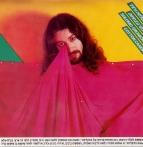
Comments:
Shlomo Gronich started his musical career in the early 70s, and is now regarded as one of the first prog artist to emerge from the Israeli rock scene with his 1971 debut Why didn't you tell me?!. The early 70s saw collaborations, with like-minded musicians, to produce a style of rock that combined jazz, classical, theatrical, and traditional Jewish/Israeli folk music with 60s era psychedelia and 70s prog. Gronich reached artistic success in 1975 with the release of the classic Ktzat Acheret(reviewed below), but his musical career quickly led him away from the rock world to compose for film, television, theater, and with various jazz and avant-garde projects. In 1982, though, Gronich briefly came back to prog with the innovative, and unique, Cotton Candy. Cotton Candy is not a "traditional" prog album, but the combination of dozens of musical styles, use of dissonant melodies, and inclusion of cabaret rhythms will impress most prog collectors. When I first heard Cotton Candy, my ears quickly became disoriented. I could hear Morricone-esque melodies freely mixing with cabaret, prog, New York jazz, traditional Jewish folk, Brazilian rhythms, and even Zeuhl(only on the last track, "Luna Park"). Yet the styles here are so finely mixed, that the resulting outcome was new to my ears. I really want to compare Gronich to Paolo Conte from Italy since both artists freely mix Latin American influences and American jazz(especially New York jazz), with music from their respective countries. Gronich, thought, is more laid-back and smoother than Conte. The Hebrew vocals here are sometimes dissonant, in a jazz-like way, while other times melodic with a 70s French/Italian, Gainsbourg/Morricone, style. The recording quality is typical of the 1980s(especially the way the drums were recorded). At first, I placed Cotton Candy as a 1987-1990 release only to find out that it actually came out in 1982. This might be a problem for 70s prog collectors, but don't expect drum machines or cheesy synths either. You can expect guitar(both electric and acoustic), bass, and drums mixing it up with piano, accordions, sitars, saxes, and decent sounding modern keyboards. The warm "1970s" sound on the Nonames album is diluted here, though. Overall, Cotton Candy is recommended to prog fans who also like 70s Morricone, 60s French soundtrack music, Ktzat Acheret, and even Paolo Conte. This is a unique album that will reward listeners who are into a wide variety of musical styles.
Here is an excellent overview of the Israeli prog scene,
Israeli Prog Overview
Year: 1982
Compositions: 8/10
Vocals (in Hebrew): 8/10
Recording Quality(80s production might bother 70s prog collectors): 8/10
Danny Ben Israel - Bullshit 3 1/4
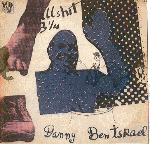
Click on the album cover to hear a sample
Comments:
Recently, a few prog/psych fans were given a tape of a
forgotten early Israeli psych album. This unknown 1970 release
featured a wild mix of fuzzed guitars, tape loops and manipulations, Indian influences,
synth noises, energetic drumming, and spazzed-out vocals from a musician probably heavily into acid. Danny Ben
Israel is a name that is not familiar to most collectors of classic
psychedelic albums from the late 60s to early 70s. His only album, Bullshit 3 1/4, was released
in 1970, but quickly vanished from the market due to poor sales and lack
of international awareness. Now with a proper CD release expected soon from
MIO Records, psych fans will be able to enjoy this lost classic. This is one of the
weirdest albums I've encountered. Early Amon Duul II, Floh De Cologne, and Mothers of Invention-era Zappa might be good comparisons, but Danny Ben sounds much more drugged and on the verge of a mental collapse. The first thing that hit me, while listening to this album for the first time, was the
unique combination of dissonant instrumental interaction with enjoyably melodic vocals. The vocals tend to
contain a certain amount of melody; sounding like mixture of Middle Eastern/Indian vocals mixed with 60s San Francisco and Beatles influences.
The instrumental work underneath, though, is generally dissonant, and schizophrenic.
I hear pianos, vibes, early synths, tape loops, congas, and Indian percussion mixing with 60s guitar, bass, and drums, and it all sounds
like someone freaking out from an LSD trip. The mood is never relaxed, but rather tension-filled and uneasy, which is unique for a
late-60s release. The lyrics, in Hebrew, talk about typical hippie concerns such as drugs, acceptance of freaks, and the
bohemian lifestyle. Once in a while, the vocalist also begins to explore Mediterranean melodies. In all, Bullshit 3 1/4 is recommended to psych fans who prefer their albums on the crazy side. This is some pretty trippy stuff, so be ready for it. Fans of Amon Duul, Amon Duul II. Group 1850, and Floh de Cologne will definitely love this stuff, but if you're a fan of Pink Floyd, Syd Barrett, and mellower psych bands you might want to grab a hold of a friend's copy to see if you'll enjoy the music. What a find!
Year: 1970 (tracks rumored to have been recorded between 1968-70)
Compositions (compared to other psych albums): 10/10
Vocals (in Hebrew): 10/10
Recording Quality (very Mothers of Invention-like): 10/10
Webpage:
MIO Records
Ktzat Acheret - Shlomo Gronich/Shlomo Ydov/Shem Tov Levy
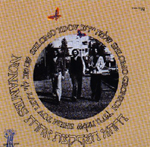
Click on the album cover to hear a sample
Comments:
I would like to thank my friend Gil for introducing me to an expanded 70s Israeli prog scene,
and a wonderful prog album by the band Nonames(or Ktzat Acheret as they are known
in Israel). Like most prog collectors in the US, Europe, and South America the only Israeli prog/psych bands that I was aware of for many years were The Churchills, Zingale, and
Sheshet. But the 70s prog scene in Israel produced dozens of albums, by two dozen bands or so,
that collectors will want to get their hands on. Nonames was a mid-70s project led by
charismatic composer/singer Shlomo Gronich, and his friends Shlomo Ydov and Shem Tov Levy.
Their only album together, released in 1975, is a classic. The new listener will quickly notice a
natural mix of prog, classical, jazz, country/folk/rock guitar, traditional Jewish music(Eastern European), and Israeli folk.
The ease that the 3 musicians play various styles of music can be compared to Gentle Giant, yet
Nonames aren't as tricky as they favor a mellow, laid-back, attitude that reminds me of Quella Vecchia Locanda and similar Italian bands. Dozens of musical instruments appear
as the album unfolds which include traditional guitar, bass, and drums along with piano, flute, acoustic guitar, violin, Moog synth, and mellotron. What really impressed me, was how unpredictable most of the melodies are. As soon as your ears guess that one of the musicians will hit a certain note, he instead goes for an unexpected note, chord, or scale. The instrumental
sound is full, yet sparse(yes, the description seems like a contradiction, but it fits perfectly) and colorful. The vocals
throughout the album are beautiful. The majority of the album is in Hebrew, and 2 tracks are in English(I prefer the Hebrew vocals, but the English tracks are ok).
The vocal interaction between the 3 musicians has a 70s style that reminded me of a mixture of
I Giganti, Quella Vecchia Locanda, and the gentle style of Gruppo 2001. There is also a humorous aspect to some of the tracks, which gives their
sometimes "serious" sections a release. The humor is easy to catch if you don't know Hebrew, because it's more
theatrical in nature. Overall, what a find! I'm surprised that this album has never been mentioned within the prog community until now; international prog collectors, and especially fans of Italian prog, will love the music here.
Year: 1975
Compositions: 10/10
Vocals (in Hebrew, and English): 9.5/10
Recording Quality(slight volume increases between various tracks): 9.5/10
Yoni Rechter & Yehudit Ravitz – Once and Forever
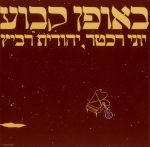
Click on the album cover to hear a sample
Comments:
Fans of Sheshet, and especially of Yehudit Ravitz's voice on Sheshet's debut album will enjoy this 1979 release. The style of music on Once and Forever could be best described as a mellower, Ennio Morricone/Brazilian sounding, Sheshet. Most of the tracks here emphasize charming vocal interaction between Rechter and Ravitz while keeping the instrumental interaction underneath interesting. Where this album really shines, though, is with the quality of the musical themes. I hear alot of Brazilian influences in most of the tracks, especially Morricone's erotica-pop sound from the late 60/early 70s. Occasional Klezmer influences also appear on a couple of tracks. Out of 12 tracks featured on the CD, I found 2 tracks rather boring. The other 10 tracks offer some of the catchiest combination of Mediterranean, Brazilian, and Jewish music I've heard. The only instrumental track even sounds like an outtake from Junta-era Phish. You know, I recommend Once and Forever as a perfect companion album to Sheshet's debut. Prog-wise, it's not of the same complexity, but music-wise, if you enjoy Sheshet you will definitely love what could be considered a relaxed follow-up.
Year: 1979
Compositions: 9/10
Vocals (in Hebrew): 10/10
Recording Quality(very warm): 10/10
Sheshet - Sheshet
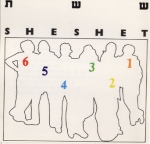
Click on the album cover to hear a sample
Comments:
Sheshet were the top prog band to emerge from the 70s experimental rock scene in Israel. This 6-piece band featured guitar, bass, and drums along with Rhodes and acoustic piano, flute, and male/female vocals. Unfortunately, like Locanda Delle Fate in Italy, by 1977 the band found little interest from public and the media, and so they quickly dissolved leaving behind them a forgotten masterpiece for the few people willing to listen. New listeners will quickly enjoy a jazzy form of prog, influenced slightly by Gentle Giant and 70s jazz-fusion yet delivered like Italian prog, where Rhodes piano, flute, and Hebrew male/female vocals immediately draw attention with mediterranean melodies, charm, and warmth. The album features strong compositions from beginning to end, and although most of the tracks average 5-minutes each, each musician takes advantage with some impressive soloing and countless catchy themes. It's hard for me to compare Sheshet with another band or album, but Cuba's Sintesis is a close comparison. Judith Ravitz's vocals, which are the album's highlight, also somehow reminds me of Jane Duboc's style on Bacamarte's debut album. Overall, what a wonderful album to start your Israeli prog collection with. The music is strong enough to impress hardcore prog collectors, yet catchy enough to appeal to the casual music fan. If you enjoy this release, I recommend Yoni Rechter & Yehudit Ravitz's Once and Forever as a good follow-up.
Year: 1977
Compositions: 10/10
Vocals (in Hebrew): 10/10
Recording Quality: 10/10
Trespass - In Haze of Time
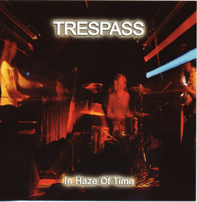
Comments:
Fans of vintage keyboard-based prog will be in for a treat with this CD. Trespass are a new 3-piece band from Israel, but they released a CD featuring music that could have
easily come out of another era. This 3-piece band is led by virtuoso keyboard player Gil Stein, and he is supported by a top-notch bassist, and drummer. Keyboard-wise, I hear Hammond, piano, and occasional synth leads. Gil also plays guitar on several tracks, but that instrument never leads. To my ears, Trespass comes close to ELP mixed with the playfulness of Trace and Finch(without the guitar leads). These guys love to swing jazzy Bach-influenced keyboard lines in odd time signatures, to give you a general idea. The CD booklet mentions that the band decided to keep a "free and breathy" sound, and those two words also fit perfectly with the style of prog on this CD. While instrumentally things get complex, I found the lyrics rather simple in nature. My guess is that the band wanted to balance out the frenzied playing with something easy-going. So, instead of singing about complex "prog" topics in a lengthy manner, the guys repeat simple sentences such as "I'm lost in time!" or "I'm in the mood to love you, baby". While this might surprise some prog fans, I found the simple lyrics a good balance to the complex instrumental sections. The use of 70s-styled vocal harmonies is likeable. Overall, this is on my Top 10 list of new releases. The vintage sound combined with incredible musicianship, and playful ideas will impress most fans of keyboard-based prog. Album number two already sounds like a monster!
Webpage:
Musea Records
|
